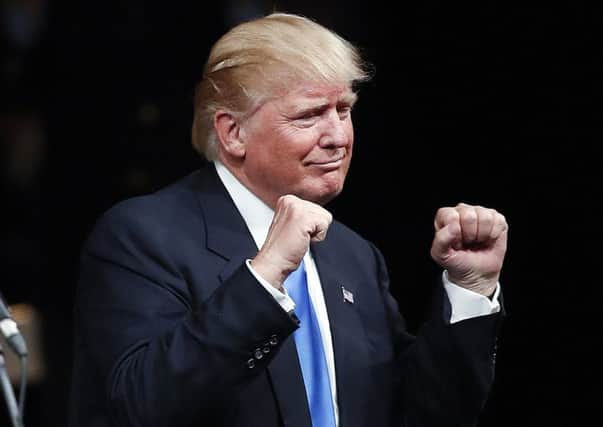Why US elections are nastier than British ones


David Cameron was told by Ed Miliband he was “chicken”. Meanwhile in the US, Donald Trump has said he would lock up Hillary Clinton.
Numerous accusations of sexual harassment and assault have been levelled at Trump.
Advertisement
Hide AdAdvertisement
Hide AdHillary Clinton’s husband was accused of being a rapist. Clinton has called Trump a racist.
It’s open season in the US. The two candidate’s daily sparring is a far cry from what would be seen, and for that matter allowed, during UK elections.
Freedom of Speech
Nasty words, phrases and allegations essentially are all allowed by law in the US.
So Mr Trump can call for a temporary ban on Muslims entering the US, label Mexicans “rapists” and repeatedly call his rival “crooked” because the country’s First Amendment rights to freedom of speech basically trump anything else (no pun intended).
Less aggressive but still fairly nasty, Mrs Clinton can call half of her rival’s supporters a “basket of deplorables”.
Take Mr Trump’s claim that Mrs Clinton co-founded Isis (along with Barack Obama). “In a country with stricter libel or defamation laws, there would be some kind or legal advice against making that type of claim,” says Jacob Parakilas, the deputy head of the US and Americas Programme at Chatham House.
Politicians would be unlikely to call for a temporary ban on a whole religious community or label a certain population as rapists because they would probably be found guilty of committing a racial hatred offence under the act.
Another reason politicians in the UK may hold back is because of our stricter defamation laws, where the defendant must prove they did not harm the claimant’s reputation rather than the burden of proof being on the claimant.
Election length
Advertisement
Hide AdAdvertisement
Hide AdUS election campaigning tends to last longer than in the UK, meaning the mood is more likely to descend into nastiness after each candidate sets out their platform for presidency.
Election structure
The structure of elections in the US makes it easier to make personal attacks.
There, you are voting for an individual to become leader, whereas in the UK, we vote for the party we want at a constituency level.
It is easier to criticise a person than a party or a platform, says Mr Parakilas.
Election tone
But the nasty tone of US elections is not just down to the Trump/Clinton combo.
In recent US election history, according to Mr Leeper, campaigns have a higher degree of negativity than in UK elections, and encompass a style of campaigning that is accusatory about your opponent rather than being a positive expression of your own strengths and qualities.
“We are seeing historically high levels of negativity, although it is difficult to compare to campaigns before the forties and fifties, pre-mass media.
“But it is a historical anecdote that American campaigns, even in 1800s, were extremely negative.”
Advertisement
Hide AdAdvertisement
Hide AdAccording to the Pew Research Centre, more than 70 per cent of US voters see the election as “too negative”.
But the experts point out there is also evidence that people are more responsive to negative content. “So when you put out an ad that criticises your opponent for being incompetent or corrupt, that actually seems to be more effective in persuading [voters],” Mr Leeper adds.
Election strategy
In UK politics to run for Prime Minister you will have had to have been an MP first, typically having served a prominent position in the cabinet.
Even though there’s been a trend in the UK to dismiss people who are “career politicians”, most will have had to have been serving politicians for at least ten years.
But in the US, there is a tradition of running for leader with very little in terms of politics on the CV – in the current election, retired neurosurgeon Ben Carson, businesswoman Carly Fiorina and businessman Mr Trump have all ran as Republican candidates.
For Mr Trump, this has allowed him to launch more blistering attacks on the establishment and therefore Mrs Clinton – the former First Lady who also served as Secretary of State.
Playing up to the media
Given presidential candidates can pretty much say what they want and the fact that negativity sells among voters, there may be an element of using provocative, or even nasty, language to play up to the media.
So when Mr Trump called his opponent a “nasty woman” in the third presidential debate, he knew it would get picked up by the media.
Advertisement
Hide AdAdvertisement
Hide AdAnd when Mrs Clinton called half of her rival’s supporters a “basket of deplorables”, even though it was seemingly scripted, she was possibly hoping it would invigorate her supporters, says Mr Leeper.
These terms would be unlikely to be heard during a UK election because what politicians in the two countries say in public and in a legislative space is very different, says Mr Leeper.
This article originally featured on our sister site iNews.
